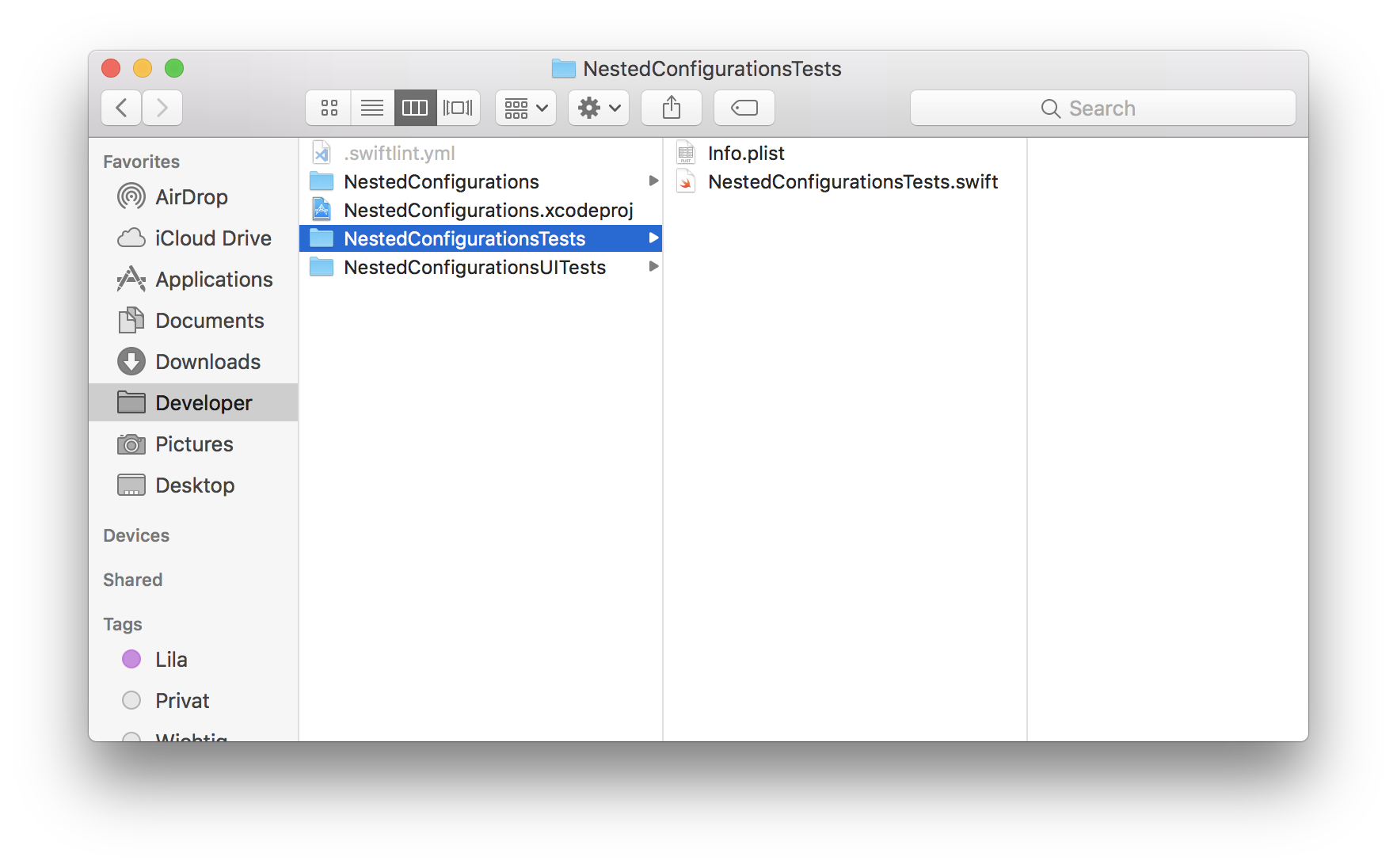SwiftLint is an indispensible tool in the arsenal of the modern iOS developer. If you have more than a single iOS developer on the team, chances are you are already using it to enforce style guides and perform linting. Our iOS Team discusses new rules on a regular basis and decides which ones make sense for our style guide.
However, if you are working on multiple projects at the same time, updating the
.swiftlint.yml files can become a hassle. Luckily, there’s a way out of this
repetitive task.
Hosting and loading the shared config
We use a dedicated repository to host our coding guidelines and best practices.
Part of that repo is our default .swiftlint.yml file that we keep updated.
Luckily, most git providers make it easy to download files via an API: Here’s how to get a file from GitHub:
SWIFTLINT_CONFIG_PATH="/tmp/.swiftlint.yml"
curl -s https://raw.github.com/realm/SwiftLint/.swiftlint.yml -o $SWIFTLINT_CONFIG_PATH
(Notice the raw.github.com)
GitLab provides a similar API. If your provider does not have an API, you can use the git-archive command:
git archive --remote=git://yourGitRepo.com/<user>/<repo> .swiftlint.yml | tar -x -C /tmp
Using the shared file for linting
Using the file is a trivial matter:
/usr/local/bin/swiftlint autocorrect --config ${SWIFTLINT_CONFIG_PATH}
/usr/local/bin/swiftlint lint --config ${SWIFTLINT_CONFIG_PATH}
You can extract all of this into a script (say, run-swiftlint.sh) and replace
your SwiftLint build phase with an invocation of this script (or just paste it
in the Run Script phase).
Be aware that this will download the .swiftlint.yml on every single build.
Since this will slow local builds and rate limiting is a thing with most
git providers, this is a bad idea.
In production, we use a more sophisticated script.
It will try to download the file at most every 24 hours, or if it was deleted.
Furthermore, it employs caching because If-Modified-Since requests
do not count against the rate limit.
Overriding rules locally

So what do you do when the new shared configuration introduces a lot of
errors to a project so that it isn’t feasible to fix them right now? Since the
new config is shared, you can’t just disable the rules temporarily.
Luckily, SwiftLint has a feature that makes this easy:
nested configurations.
Consider the following project setup:

Let’s say your style guide forbids force unwrapping because you never ever want
the app to crash in production. Your .swiftlint.yml file then might contain a
rule that forbids them and produces errors:
opt_in_rules:
- force_unwrapping
Now, how do you allow force unwrapping in tests? You could use a
//swiftlint:disable force_unwrapping every time you want to use a !,
but this gets boring quickly. Leveraging SwiftLint’s nested configurations,
this is as easy as adding another .swiftlint.yml file to your Tests folder
that disables the force_unwrapping rule again for this subfolder:
disabled_rules:
- force_unwrapping
You can now force unwrap in your test files like there’s no tomorrow!
This feature can be used to disable rules that are new to the shared config but
break the local project. Unfortunately, I haven’t found a way to put a
.swiftlint.yml file in the root folder of the project since that one is
overridden by the --config parameter in the script, so you have to create
separate ones for the Sources and Tests directories.
⚠️ Limitations
include and exclude will be ignored in nested configurations, so you
probably should have folders like Pods or Carthage in the shared
configuration.
Recap
- Use a shared
.swiftlint.ymlthat is hosted somewhere on your git - Download the file before linting using a script
- Replace your SwiftLint build phase with the script
- Override shared rules with specific ones using Nested Configurations
This is the script we currently use across our team:
#!/bin/bash
SWIFTLINT_CONFIG_PATH=".swiftlint.yml"
TEMP_FILE=".temp.yml"
# If the file does not exist or is older than 1 day, download it
if [[ ! -f $SWIFTLINT_CONFIG_PATH ]] || [[ $(find "$SWIFTLINT_CONFIG_PATH" -mtime +1 -print) ]]; then
last_modified=$(date -u -r $SWIFTLINT_CONFIG_PATH "+%a, %d %b %Y %H:%M:%S GMT" 2>/dev/null || true)
http_code=$(curl \
-H 'Accept: application/vnd.github.v4.raw' \
-H "If-Modified-Since: $last_modified" \
-w "%{http_code}" \
-o $TEMP_FILE \
https://api.github.com/repos/adorsys/csi-coding-guidelines/contents/iOS/.swiftlint.default.yml)
if [[ 200 == "$http_code" ]]; then
mv $TEMP_FILE $SWIFTLINT_CONFIG_PATH
else
rm -f $TEMP_FILE
fi
fi
if [[ -e $SWIFTLINT_CONFIG_PATH ]]; then
"${PODS_ROOT}/SwiftLint/swiftlint" autocorrect --config ${SWIFTLINT_CONFIG_PATH}
"${PODS_ROOT}/SwiftLint/swiftlint" lint --config ${SWIFTLINT_CONFIG_PATH}
fi
You can also find the current version on our GitHub.